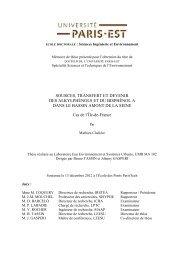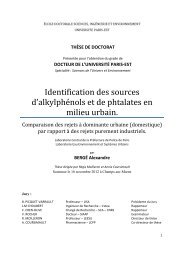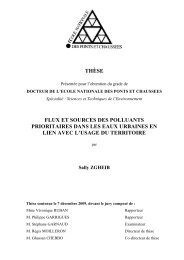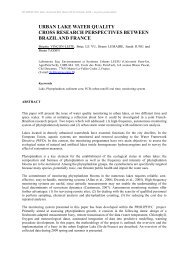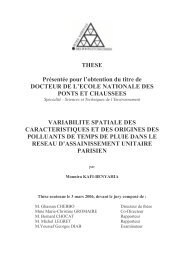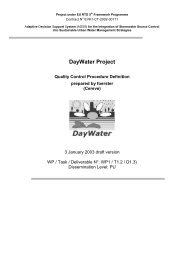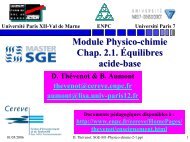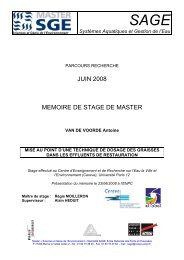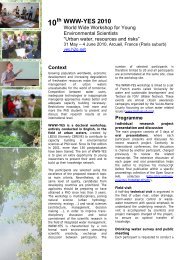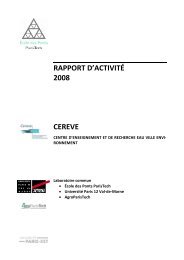View - ResearchGate
View - ResearchGate
View - ResearchGate
Create successful ePaper yourself
Turn your PDF publications into a flip-book with our unique Google optimized e-Paper software.
The Israel Water Drilling Control Act of 1955 forbids any form of pollution, which it defines in avery broad manner. According to the Act, pollution includes “a change in the properties of waterin a water resource in physical, chemical, organoleptic, biological, radioactive or other respect,or a change as a result of which water is dangerous to public health or likely to harm animal orplant life or less suitable for the purpose which it is used or intended to be used” 6 .In Jordan, the quality of water is controlled by the Ministry of Water and Irrigation 7 . Theextraction authorisations granted by this administration entail an obligation not to cause anypollution to groundwaters.In Lebanon, the By-Law of 1993 includes general provisions relating to the protection ofgroundwaters but falls short of proposing any specific measures.In Syria, the Act No. 31 of 2005 includes the following provisions as regards the protection ofgroundwaters:“- Public water quality control and pollution prevention are coordinated by various ministriesand public institutions; the administration in charge of quality control, which belongs to theMinistry of Irrigation, carries out the controls.- Any pollution identified according to the standards and criteria in force is notified to theMinistry of Environment and to the city in order to determine the cause of pollution.- Administrative proceedings are then initiated and the pollution case processed within theframework of the Act No. 50 of 2002” 8 . For instance, deliberate pollution of a water spring orintentional damage to public irrigation works is punishable under criminal law by one to threeyears of imprisonment and a fine in amount of SYP 200,000 9 .Whether relating to groundwaters or surface waters, existing legal mechanisms relating to theprotection of water in Middle Eastern countries only apply within the geographical territory ofthe state and are only rarely the subject of concerted action between states. This situation is allthe more detrimental as the interconnection between the constitutive components of water basinsfacilitates the diffusion of polluting substances (industrial waste, salt water) beyond politicalborders. It is therefore in these countries’ interest to harmonise the laws relating to the protectionof water quality, especially as regards groundwaters, more critical because of their slowreplenishment rate and their often hard to monitor mobility.b) Protection against depletion (control of extraction and utilisation)In the Jordan basin riparian states, groundwater extraction and exploitation is subject to domesticlaws regulating the issuance of drilling authorisations on the one hand and quantity control onthe other hand.- Jordan: Underground Water Control By-Law (By-Law No. 85 of 2002)- Israel: Water Drilling Control Act of 1955- Lebanon: By-Law 14438 of 1970 organizing the prospecting and use of groundwater,- Syria: Act No. 31 of 2005Syrian law (the most recent) sums up the concerns shared by all riparian states regarding thedifficult monitoring of this “hidden treasure”. It notably provides that:6 Article 1 A, section 20A, chapter 2 of the Water Drilling Control Act 1955“- any extraction project is subject to prior authorisation- extraction in protected areas (aquifer replenishment areas) is prohibited,- the drilling of new wells is forbidden, unless exceptionally authorised by the Ministry,- a specific administration equipped with modern technical means enforces these mechanisms,- if the law is broken, serious penalties are provided for under criminal law” 10 .Even though these very strict mechanisms relating to the protection against depletion forbid newwells from being drilled and authorised water quantities from being exceeded, it has to beacknowledged that the drilling of unlicensed wells and non-abidance by the extraction limit havemultiplied in the past few years. For instance, private Jordanian wells, which representapproximately 60% of the total number of wells, are not subject to control for the main part, orare equipped with broken water-meters (Stephan, 2007).In Syria, the FAO estimates at 53,453 the number of unauthorised wells, i.e. approximately halfthe total figure for the country (FAO, 1997) 11 .In Israel, a report by the State Comptroller on the Management of the Water Sector of 1990noted that over-exploitation of costal and mountain aquifers was the first cause of water qualitydeterioration. In the same report, emphasis was laid on the fact that, despite both aquifersundergoing depletion, additional extractions had been authorised by the Water Commissioner incharge of water management, in total contradiction with the new, alarming water figures (Adam2000).At this point, we can only note the continued over-exploitation of the water resources which thepublic authorities have difficulty controlling and acknowledge that, as things stand, it is notpossible to check the dramatic deterioration and depletion of these resources.CONCLUSIONIn view of these over-exploitation and pollution issues, national law must meet the requirementsof sustainable development by reinforcing water-related legal mechanisms.It is also absolutely necessary to harmonise water-related national legislations if we want to beable to act efficiently against the threat to this vital and universal resource. International WaterLaw developments must take this target into account and encourage states to cooperate.The most recently codified legal text pertaining to International Water Law - the Convention onNon-Navigational Uses of International Watercourses of 1997-, as well as the new draft articleson transboundary aquifers of 2008, emphasise the concept of the unity of water sources and thegeneral principles of the obligation not to cause significant harm, of the equitable and reasonableutilization and participation, and of the obligation to notify, consult and negotiate. It isparticularly urgent to put these principles into practice in the Middle East, where the currentproblems shared by all the countries cannot be settled fairly without cooperation and solidarity.However, the persisting conflictive context which strengthens the states’ attachment to theprinciple of absolute sovereignty (although that same sovereignty is lacking for Palestinians)makes fair management difficult to organise.7 Article 4 A of Underground Water Control By-Law (By-law No. 85 of 2002), text available at the website ofMinistry of Water and Irrigation in Jordan www.mwi.gov.jo, last accessed 22 March 2008.8 Article 50 of the decree relating to the Act No. 31 of 16 November 2005.9 Article 35A, chapter 7 of the Act No. 31 of 16 November 2005.10 Water legislation, Act No. 31 of 16 November 2005”, Syrian Official Journal, Techrin, November 2005.Translated from the Arabic by the author.11 FAO, Aquastat, 1997, available at www.fao.org/nr/water/aquastat/main/indexfra.stm, last accessed 13 mars 2007.WWW-YES 2008, Paris 13 – 16 May 2008 9WWW-YES 2008, Paris 13 – 16 May 2008 10


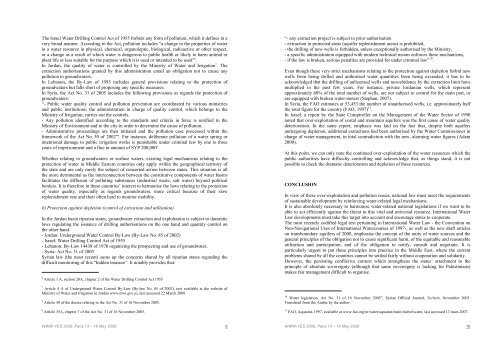
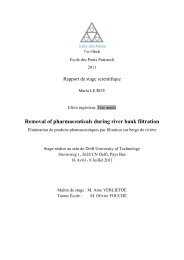
![[pastel-00730831, v1] Incidence des pratiques d'entretien ... - LEESU](https://img.yumpu.com/50938896/1/184x260/pastel-00730831-v1-incidence-des-pratiques-dentretien-leesu.jpg?quality=85)
